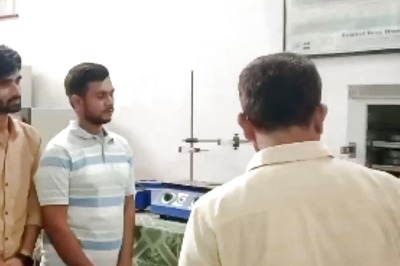
views
New Delhi: In a bid to ensure transparency in the functioning of the judiciary, the Government on Wednesday proposed to set up a National Judicial Council to probe complaints against judges of higher judiciary.
A meeting of the Union Cabinet, chaired by Prime Minister Manmohan Singh, decided to introduce the Judges (inquiry) Amendment Bill, 2008 in Parliament.
The Bill seeks to establish a National Judicial Council (NJC) with powers to investigate complaints against the judges of higher judiciary and recommend suitable action after following the prescribed procedure, Finance Minister P Chidambaram said after the meeting.
The Bill provides for a five-member NJC - all drawn from the Judiciary - comprising of the Chief Justice of India as the Chairperson, two senior-most judges of the Supreme Court and two Chief Justices of the High Courts to be nominated by the Chief Justice of India.
"The provisions of the new Bill would bring transparency in the functioning of the judiciary and would also enhance its prestige," Chidambaram said.
"The Council will decide on the penalties on erring judges and judges alone will be members of the Council," he said.
The Cabinet has also decided to withdraw the originally conceived Judges (inquiry) Bill, 2006 introduced in the Lok Sabha on December 19, 2006.
The withdrawal of the original Bill was in consonance with the recommendations made by the Parliamentary Standing Committee on Law and Justice in this regard, he said.
In the backdrop of increasing allegations of misconduct against judges, the Committee had earlier asked the government to expedite the process of enacting a law on judicial accountability during the coming session of Parliament.
The panel had suggested amendments to the original Bill that dealt with issues related to judicial misconduct and suggested to the Law Ministry that the legislation should be considered by Parliament in the session starting on October 17.
Referring to the recent cases in which judges were accused of serious misconduct, the Committee observed that the public expectation is high now and the Government should step in and gain the confidence of the people.
The recommendation came close on the heels of the Supreme Court allowing a Central Bureau of Investigation (CBI) probe in the Uttar Pradesh Provident Fund scam allegedly involving 34 judges and the impeachment move against a tainted Calcutta High Court judge.
The panel wanted to do away with the constitutional requirement for an impeachment motion having signatures of 100 Members of Parliament.
According to the Government the provisions of the new Bill would bring transparency in the functioning of the judiciary and would also enhance its prestige.
However, the Chief Justice of India is opposed to any such move by the government as he feels it will compromise the independence of judiciary and also result in undue harassment of judges.




















Comments
0 comment